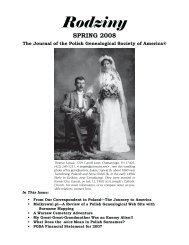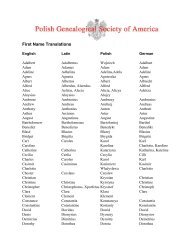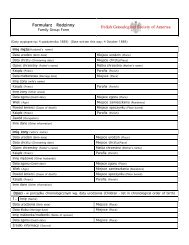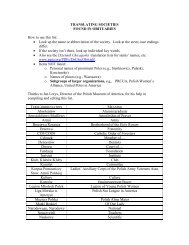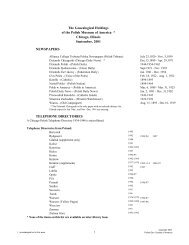A Crash Course in Polish: Words You Can Use
A Crash Course in Polish: Words You Can Use
A Crash Course in Polish: Words You Can Use
Create successful ePaper yourself
Turn your PDF publications into a flip-book with our unique Google optimized e-Paper software.
Phrases Referr<strong>in</strong>g to Birthplace and Orig<strong>in</strong>s<br />
The follow<strong>in</strong>g are phrases often seen that tell of the deceased’s birthplace:<br />
u. ur., uro., urodz. — these are all abbreviations for urodzony, “born.”<br />
urodził/urodziła się w — “was born <strong>in</strong>.” If the place of birth is given, it is usually followed by<br />
the preposition w, “<strong>in</strong>” (sometimes na), plus the name of some geographical entity, <strong>in</strong> the<br />
locative case.<br />
urodzony w [starym] kraju — “born <strong>in</strong> the [old] country,” i. e., Poland<br />
urodzony w Polsce — “born <strong>in</strong> Poland”; Polsce is locative of Polska, “Poland”<br />
urodzony w Królestwie Polskim — “born <strong>in</strong> the K<strong>in</strong>gdom of Poland”<br />
urodzony w Księstwie Poznańskim — “born <strong>in</strong> the Duchy of Poznań”<br />
urodzony w gubernii grodzieńskiej — “born <strong>in</strong> Grodno prov<strong>in</strong>ce”<br />
Occasionally you may see the name of a a town or village, sometimes preceded by such expressions<br />
as w mieście, from miasto, “town, city”; or w miasteczku, “<strong>in</strong> the small town,” from<br />
miasteczko; or we wsi, “<strong>in</strong> the village,” from wieś, “village.”<br />
pochodził z — “came from.” The place of orig<strong>in</strong> could also be expressed with the past tense of<br />
pochodzić, “to come from, to have orig<strong>in</strong>s <strong>in</strong>,” plus the name of the geographical entity <strong>in</strong> the<br />
genitive case. Us<strong>in</strong>g the same examples given above, note how the end<strong>in</strong>gs change or fail to<br />
change:<br />
pochodził [or przyjechał] ze [starego] kraju — “he came from the old country”<br />
pochodził z Polski — “he came from Poland”<br />
pochodził z Królestwa Polskiego — “he came from the K<strong>in</strong>gdom of Poland”<br />
pochodził z Księstwa Poznańskiego — “he came from the Duchy of Poznań”<br />
pochodził z gubernii grodzieńskiej — “he came from Grodno prov<strong>in</strong>ce”<br />
And <strong>in</strong> some cases a place name may be specified, perhaps preceded by z miasta, “from the<br />
city,” or z miasteczka, “from the small town,” or ze wsi, “from the village.”<br />
Other Phrases Often Seen<br />
Boże okaź mu/jej miłosierdzie — “God, show him/her mercy.”<br />
Cześć jego pamięci or Cześć jej pamięci — “Honor to his/her memory.”<br />
Niech mu/jej ziemia będzie lekka — “May the earth be light for him/her.” Sometimes the<br />
expression is not just ziemia but ta obca ziemia, “this foreign soil,” express<strong>in</strong>g a wish<br />
that the immigrant may rest easy <strong>in</strong> this foreign land [America].<br />
Pochowany — “buried,” typically with details on the funeral, such as the date.<br />
Prosi o modlitwę — “Ask<strong>in</strong>g for a prayer” (i. e., “Please say a prayer for him/her.”)<br />
Prosi o westchnienie do Boga — “Ask<strong>in</strong>g for a sigh to God.”<br />
Prosi o Zdrowaś Maryjo — “Ask<strong>in</strong>g for a ‘Hail Mary’.”<br />
Stroskani — “Sorrowful, woebegone,” referr<strong>in</strong>g to the surviv<strong>in</strong>g relatives, e. g., a child’s<br />
gravestone may mention his stroskani rodzice, “grief-stricken parents.”<br />
Wieczny odpoczynek racz mu/jej dać Panie — “Lord, grant him/her eternal rest,” presumably<br />
modeled after the first words of the Lat<strong>in</strong> Requiem Mass, Requiem aeternam<br />
dona eis Dom<strong>in</strong>e, “Lord, give them eternal rest.”<br />
Wieczny pokój — “Eternal rest.”<br />
Hoffman – A <strong>Crash</strong> <strong>Course</strong> <strong>in</strong> <strong>Polish</strong>: <strong>Words</strong> <strong>You</strong> <strong>Can</strong> <strong>Use</strong> – 14



